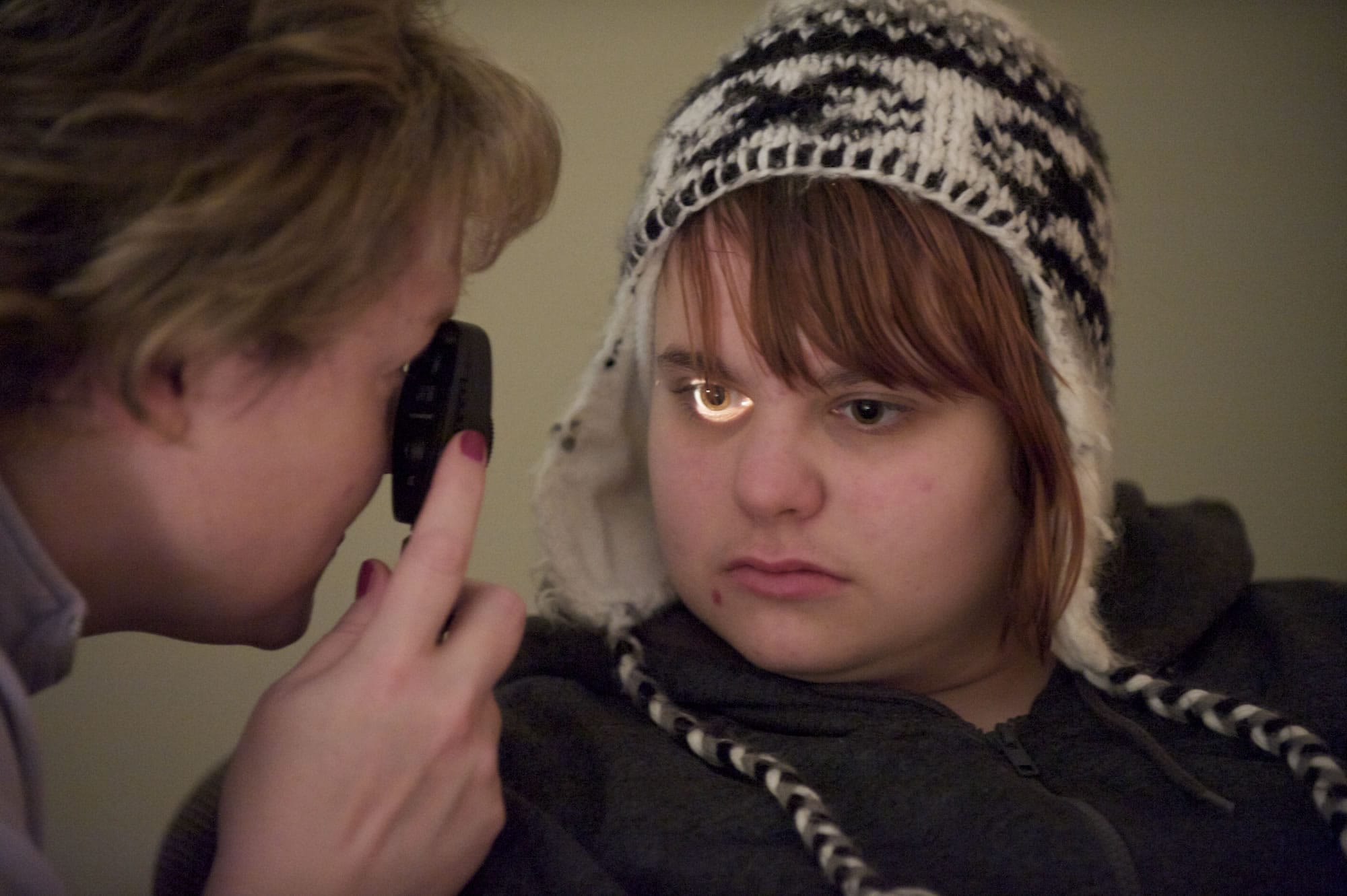Good news for Kimberly Fling: Type 2 diabetes hasn’t damaged her eyes. Fling is 20, pregnant, and homeless; she and her husband are staying with his mother. “For now,” she said.
Bad news for a man who was sagging at the Medical Reserve Corps first aid station: “Dangerously high blood pressure,” said registered nurse Justine Schneider — high enough to risk a stroke. Schneider and a colleague called an ambulance, and the man was taken away.
Homeless people got medical, dental and eye exams for free on Thursday at Project Homeless Connect, an annual clearinghouse of services and resources that’s coordinated by the Council for the Homeless and hosted by Living Water Church on Northeast 65th Avenue.
Optometrist Suzanne Zamberlan of Evergreen Eye Care has volunteered with Project Homeless Connect for years. “If I could do something like this every month, it would be great,” said Zamberlan. Every person who came through Zamberlan’s station at Project Homeless Connect left with a pair of new glasses and a used (donated) backup pair that was as close to the right prescription as possible.
At the foot care and hygiene station, homeless folks were removing battered shoes and shredded socks so nursing students from the University of Portland could wash and examine worn feet. At least one case of frostbite had already been detected by lunchtime.
“If you live outside on the streets, in the elements, you don’t have the luxury of washing and drying your feet every day,” said Charlene Welch, administrative coordinator for the Council for the Homeless. “And you don’t have access to good shoes and dry socks.”
Foot neuropathy — that is, nerve damage — isn’t always obvious even to diabetic people who live in comfort; homeless people may be even less aware of the health of their feet, putting them more at risk for serious problems.
It was the sixth annual Project Homeless Connect, and Living Water Church was full of hundreds of needy people and dozens of service providers. There were haircuts and hotlines; free lunch and free coats; veterans and disability benefits; job- and house-hunting assistance; bus passes and rental help for homeless youth; and lots more.
But the medical-services side of the building was where the bulk of people lined up and waited patiently to be seen.
“A lot of illnesses, a lot of people who don’t have medications, ” said Schneider. “A lot of drug and alcohol problems. A lot of situations that wouldn’t have to be so bad except for people’s economic constraints.”
Until 2012, Project Homeless Connect was held in downtown Vancouver, generally seen as the most logical location to reach the homeless. Last year was the first time the event was held at Living Water Church, just south of Fourth Plain in central Vancouver. Many had been skeptical about the new location, said David Moore, housing resource specialist for the Council for the Homeless.
But the crowd of hundreds that mobbed Living Water Church on Thursday underlined how well it worked.
“Word has travelled,” said Moore. “It’s part of the culture of Vancouver now. And we know how to do this. It’s gotten smoother. It’s easier to get everyone to the right place.”
“It’s perfect,” said a cheerful woman as she waited for an eye exam. “Right on the bus line.” While employed and not homeless, the woman said she still has no health insurance and was in serious need of glasses Thursday in order to hang onto her job — working traffic control.
Michael Boldt, assessment center coordinator for the Council for the Homeless, pointed out the careful triage of people’s needs as they walked in the door. The Council plans to keep pilot-testing the same sort of thorough, individualized assessment in the run-up to the March opening of its Housing Solutions Center — nearby on Andresen Road, where it will share space with Share’s new Fromhold Service Center.
The Housing Solutions Center aims to offer, permanently, the same sort of one-stop shopping for services of all sorts that Project Homeless Connect offers just one day a year, Boldt said.
Thursday also saw the council conduct its annual Point-in-Time count. Volunteers and employees of various agencies fanned out in an attempt to count all the homeless in Clark County, whether in shelters, camps, on the streets or at Project Homeless Connect. The data are used to track trends and needs, and reported to the federal government. Results of the count will be released later this year.
Scott Hewitt: 360-735-4525; scott.hewitt@columbian.com..




